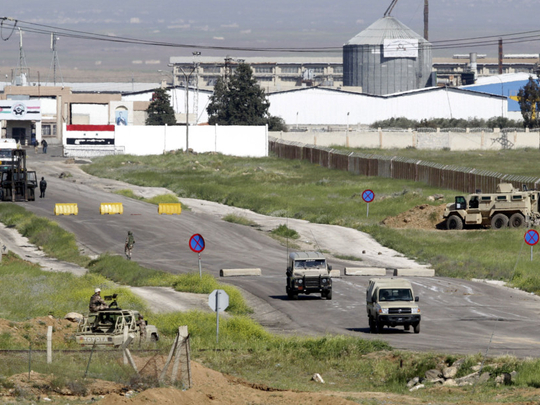
Amman: When security fears forced Jordan to close its last border crossing with Syria this month, it severed its most important trade route to the outside, further straining an economy already hit by fallout from the war across the border.
But the damage to heavily import-reliant Jordan is not just hypothetical — hundreds of importers and exporters lost millions of dollars worth of goods when rebels pillaged the vast free trade zone that straddled the border, most of it on the Syrian side.
Car importer Mohammad Bustnje says he was among the lucky ones, losing only tens of thousands of dollars when looters ransacked his offices and made off with televisions, air conditioning units, even doors and windows.
Bustnje said he had had a premonition there would be trouble at the 700-hectare Jordanian-Syrian Free Zone, and moved all the vehicles he had warehoused there into Jordan.
“Thank God,” he said, “because the rest of the importers lost hundreds of cars” in looting after rebels seized the Syrian side of the crossing this month.
Nabeel Romman is chairman of the Jordanian investment commission for the zone, which contains not only warehouses but even assembly plants for some goods.
He said there were more than 1,000 traders doing business there — Syrians, Jordanians, even Iraqis — with a combined inventory of more than $1 billion (Dh3.67 billion).
He said it is estimated that $100 million in goods was stolen.
The Syrian side of the border was seized on April 1 by rebels with links to the local Al Qaida affiliate, Al Nusra Front, and the situation on the ground was volatile.
More recently, however, the security situation has become more stable, and there are reports that Jordanian traders are now able to get into the zone and are gradually bringing goods out.
But when what the Jordanians know as the Jareb crossing was captured from troops loyal to President Bashar Al Assad, it was not only the traders who faced immediate problems.
Hundreds of truckers were stranded on both sides of the frontier with their cargos, impacting Jordan’s wider population, not just its entrepreneurs.
Romman said the “Jaber crossing is a vital artery between us and Europe. Seventy per cent of what we eat, of everything we import and export, passed through Syria.”
Goods were brought in and exported by sea from Lebanon, or even travelled overland through Turkey farther north.
Mohammad Dawood, president of the Jordanian truckers’ union, estimates that the long-term damage from lost trade with not only Syria, but also Iraq, could reach $500 million.
He said around 2,500 trucks crossed the Syrian border daily before the Syrian uprising broke out four years ago and degenerated into civil war. That number was down to “a couple hundred when the border was closed. Now it is zero.”












